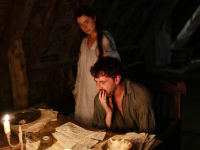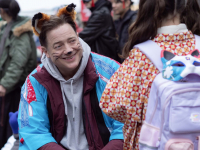
Also known by the moniker Seven Sisters in the rest of Europe, What Happened to Monday is a dystopian sci-fi thriller that can at present only be found on Netflix.
We settle down in for the evening to see what it’s all about. The theme is not uncommon in dystopian fiction. The year is 2073 and overpopulation is putting the world into the crisis, as such, the Child Allocation Bureau (C.A.B) have enacted a one-child policy. If a mother bears more than one child, all but the eldest are placed into cryosleep for an indefinite amount of time.
The thought of twins being harrowing enough at this time, it is Karen Settman who gives birth to identical septuplets, then immediately dies. However, the newborn sisters’ grandfather, Terrence (played by the legendary Willem Dafoe) shields their existence from the authorities and ensures that they have the skillset to hide themselves over the years. Naming them after the days of the week; Monday, Tuesday, Wednesday, Thursday, Friday, Saturday and Sunday all only leave their home on their assigned day to live their lives in the outside world, using the name of their deceased mother.
Through a complex system of wigs, make-up, clothing and sharing information with one another to ensure they don’t slip up, the sisters live in relative equilibrium in the totalitarian regime. That is until Monday doesn’t come home, and the sisters must fight for their secret.
If people thought that Tom Hardy took on a mammoth task by playing both of the Kray twins in Legend; then Noomi Rapace, who plays all seven sisters should have people staring in disbelief. That said, this is not the first time that a very similar theme has been used. Those who have seen Orphan Black (in its life on BBC Three before it was removed) will remember a stunning performance from Tatiana Maslany across the series in which she played clones, not septuplets and did so fantastically.
Unfortunately, Noomi Rapace doesn’t quite have the same source material or direction quality as Maslany did but she gives an admirable go of it. As opposed to several series worth, Rapace much attempt to characterise seven distinct personalities from the sisters whom, all with their respective traits (one is outgoing, one likes to read etc.) never make it too much further into themselves than their superficial traits in the two-hour run time. This isn’t at all a shot at Rapace, given the time-span and the source material her work is amazing, it’s just a shame that she didn’t have room to explore the identities.
The only other key supporting character comes in the form of Nicolette Cayman, played by Glenn Close. Despite Close’s pedigree as an actress, she loses this role a bit. She plays a character that feels like it’s been taken off a rack of sci-fi villains, with very little nuance or identity. Again, this isn’t entirely her fault either, she too, lacks the screen time to show the nature of her evil ways.
It is in fact, the direction that lets the film down. The screenplay by Max Botkin and Kerry Williamson actually won an award in 2010 for the best-unfinished work. However, it’s almost as though they took that to mean that the work was indeed finished and the script was ready.
Director Tommy Wirkola has taken the screenplay on but seems to struggle to link the work together, and we’re left with a movie that punctuates long spells of dialogue with sporadic action scenes. It makes for a piece that is literally filled with sections of sitting around talking when, all things considered (i.e. a sibling disappearing), there should be more literal action from the character.
There is some excellent fight work reminiscent of Wirkola’s former work that also shows off the skills Rapace has picked up from her work such as The Millennium Trilogy, but it still struggles to give the film a set identity. Is it a psychological thriller? Or action-thriller? Unfortunately, we never quite find out.

Author: Steve, Southgate Store





